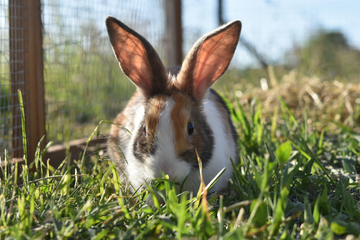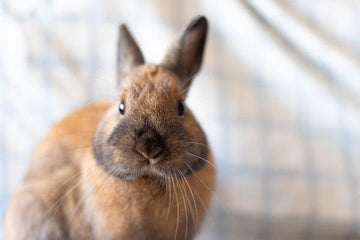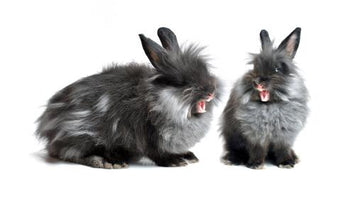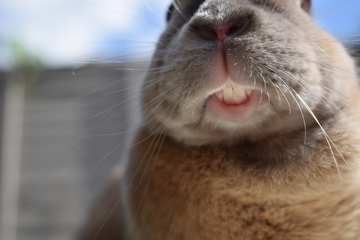4 Rabbit Diet Misconceptions You Should Never Believe
Feeding your rabbit might seem straightforward, but misinformation can make things more complicated than they need to be. Sadly, many rabbit diet misconceptions are so widespread that they can lead well-meaning owners astray. With a little knowledge, you can steer clear of these myths and keep your furry friend healthy and content. We've broken down four of the most common rabbit diet misconceptions and the truths you need to know to set the record straight.
Click Here For a Guide to Understanding Your Rabbits Diet.

Debunking Rabbit Diet Misconceptions
When it comes to rabbit care, feeding is one of the most misunderstood aspects. Many new owners fall victim to rabbit diet misconceptions that can have a big impact on their pet's health. Knowing what is true and what isn't ensures your rabbit gets the right nutrition to thrive. Let's address the common misconceptions one by one.
Misconception #1: Rabbits, Like Humans, Need Variety in Their Diet
One of the most persistent rabbit diet misconceptions is that rabbits need a constantly changing menu to stay interested in their food. This belief often comes from owners treating their rabbits like tiny humans, giving human traits to their pets. While it's endearing to view your rabbit this way, their dietary needs are nothing like ours.
Rabbits thrive on consistency, particularly when it comes to their primary food source—hay. Your rabbit's diet should consist of at least 80% high-quality grass hay, like timothy or orchard grass. A steady supply of fresh hay helps keep their digestive systems healthy and their teeth in check. Supplementing this with occasional treats or greens is fine, but too much variety can disrupt their sensitive digestive systems. A simple, predictable diet isn't boring to your rabbit—it's exactly what they need to stay happy and healthy.

If you're searching for premium hay, check out our selection of fresh hay sourced directly from Northern California. Not only is it the best for your rabbit's health, but it's also conveniently delivered to your door.
Misconception #2: Lettuce is an Ideal Food for Rabbits
When people think of feeding rabbits, lettuce often comes to mind. However, this is another dangerous rabbit diet misconception. While dark leafy greens like romaine can be a nutritious addition to their diet in moderation, certain types of lettuce, such as iceberg, can harm your rabbit. Iceberg lettuce contains lactucarium, a substance with sedative properties that can upset a rabbit's delicate digestive system.
For a healthier option, stick to nutrient-rich greens like parsley, kale, or cilantro, and always introduce new vegetables gradually to monitor for any adverse reactions. Remember, leafy greens should only complement a hay-based diet, not replace it. By understanding what your rabbit can safely eat, you'll avoid potential health issues caused by well-intentioned but harmful feeding habits.
Curious about which greens are best for your rabbit? Check out our comprehensive bunny food list for safe fruits, vegetables, and herbs!
Misconception #3: Carrots Are a Staple Food for Rabbits
Blame Bugs Bunny for this one. The image of rabbits constantly munching on carrots is classic but misleading. While carrots can be a tasty treat, they are far from a dietary staple. Too much carrot can lead to health issues like obesity or dental problems due to its high sugar content.
If you want to treat your rabbit to carrots, keep the portions small and occasional. Better yet, include the carrot tops—they're a much healthier choice and closer to what a rabbit would naturally nibble on in the wild. Leafy greens should form the bulk of your rabbit's fresh food intake, not sugary roots like carrots.
Want to learn more about proper rabbit nutrition? Download our free Hay Is for Rabbits ebook to explore the best dietary options for your bunny!
Misconception #4: Pellets Are the Ultimate Rabbit Food
Pellets are marketed as "complete" or "essential" rabbit food, leading many owners to believe they are the best choice for daily meals. However, this is one of the most common rabbit diet misconceptions. While pellets can play a role in a rabbit's diet, they should never replace hay as the primary food source. Many commercial pellets are filled with low-quality ingredients and can act as the rabbit equivalent of junk food.
If you feed pellets, do so sparingly—think of them as a supplement or treat rather than a staple. A small portion of high-fiber, hay-based pellets is fine, but the bulk of your rabbit's nutrition should always come from fresh grass hay.
Still not sure how to balance your rabbit's diet? Visit our shop to find premium hay and supplies tailored for your rabbit's needs.
Rabbit Diet Misconceptions: Final Thoughts
It's easy to fall for rabbit diet misconceptions when you want to give your pet the best care possible. But simplicity is key to a healthy rabbit diet. Stick to a foundation of high-quality hay, add a few leafy greens, and save treats like carrots and pellets for special occasions. Not only will this approach keep your rabbit healthy, but it will also help you build a stronger bond with your bunny through good care and understanding.
Ready to stock up on your rabbit's essentials? Head over to our store to browse our selection of premium hay and rabbit supplies. Unsure of the best type of hay for your bunny? Download our Hay Is for Rabbits ebook to learn all about the benefits of different hay types!

Rabbit Is It Low Maintenance or More Work Than You Think?

Signs of Rabbit Health: What You Should Know

Decoding Bunny Behavior: Understanding Rabbit Mood







